Search Results
Fine Jewelry University Articles matching: “Cluster gold round”
Showing only FJU Article results. Click here to show all results.
Fine Jewelry University (Show All FJU Articles)
-
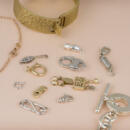
Types of Jewelry Clasps
… Clasp (Trigger Clasp, Teardrop Clasp) Lobster clasps are one of the most popular choices for people who want a well-rounded clasp that is relatively inexpensive, strong, and easy to use. They come in a huge variety of styles and shapes … by ancient Egyptians and is the oldest known clasp style. This type of clasp was often made from softer metals like gold or copper and used to fasten necklaces and bracelets. The hook-and-eye clasp was also used by the Greeks and Romans …
-
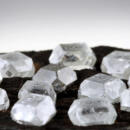
Is a Lab Grown Diamond Right for Me?
… accepted that it takes considerably less energy to grow a diamond in a lab than it does to dig it out of the ground. There is also no need to displace many tons of earth to create a lab grown diamond. You can, with 100% certainty, know … very expensive). Lab-grown diamonds are new and exciting . To put it mildly, the jewelry industry has been around for a long time. It’s quite rare that something truly new comes around. Even though man-made diamonds have been around …
-
The Birthstones
January’s Birthstone: Garnet January babies born in the midst of cold, white (valley fog) and at times stark surroundings are rewarded with one of the most varying birth gemstones, Garnet. Garnet’s pizzazz energizes the gloomiest day… is also regarded as the gem of faith, constancy and truth and possesses many curative powers. Some of the lore surrounding garnets is that it protects the wearer from nightmares, promotes long-lasting love, and prevents hearing … mechanism. When a foreign irritant is introduced either by man (cultured) or naturally, the oyster immediately surrounds it with layers of a substance called nacre. Pearls form directly from the hand of nature, ready to be admired and …
-
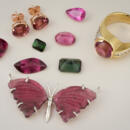
Gem in the Spotlight: Tourmaline
… the power to grant enlightenment, give power over spiritual affairs, reconcile opposites, and change base metals to gold. Tourmaline has a special place in our hearts as California natives because it is one of the few gems that are found…
-
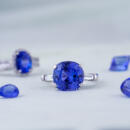
Gem in the Spotlight: Tanzanite
…. Gemology of Tanzanite Gemologists refer to this gem as blue zoisite. The vast majority (current estimates are around 95%) of tanzanite is heat treated to help bring out the vibrant blues. The stones that haven’t been heated by humans …. at the time, who named the stone tanzanite after the country of origin. Tiffany then started marketing the stone around 1968. The geological conditions required to form tanzanite are quite rare, leading some geologists to believe that it…
-
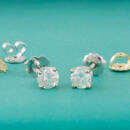
Styles of Earring Backs
… put in and take out. CONS Losing an Earring – The backless style is not as secure as lever backs or other similar styles Irritant – If used with costume jewelry made of non-precious metals, it may cause irritation to sensitive skin. Gold options found on more valuable jewelry do not typically have this problem. Lever Backs (European Backs) Lever backs, sometimes called European backs, have a curved ear wire instead of a straight post, and have a hinged lever piece that…
-

How Are Lab Grown Diamonds Made?
…. High Pressure High Temperature Diamonds How does nature form diamond crystals? Nature does it very deep underground. Diamond growing naturally takes place about 100 miles below the earth’s surface. Why? Because that is where the … above 2,000 degrees Celsius. In this environment, the pure carbon melts and begins to form into a diamond around the starter seed. On December 16, 1954, a belt press was used to create the first reproducible lab grown diamond. The diamond…
-
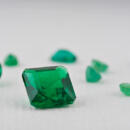
Gem in the Spotlight: Emerald
… Chalk in 1972 and can be seen on display at the National Museum of Natural History in a platinum and gold ring surrounded by 60 pear-shaped diamonds. According to workers at the Muzo mine in Columbia, it is one of the finest green …